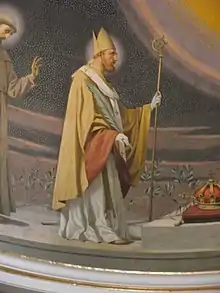Septimius of Iesi
Saint Septimius of Iesi (Italian: Settimio di Jesi) (d. 307)[1] was the first bishop of Iesi, a martyr, and a saint.
Septimius of Iesi | |
|---|---|
 Fresco of St. Septimius, by Biagio Bigatti, 1937. Iesi Cathedral. | |
| Martyr | |
| Born | Germany |
| Died | 307 AD |
| Venerated in | Roman Catholic Church |
| Major shrine | Iesi |
| Feast | September 22 |
| Attributes | Episcopal attire |
| Patronage | Iesi |
Septimius was born in Germany, and after an education in the liberal arts, began a military career. After he converted to Christianity, he parted with his family, who did not convert, and went to Italy where he worked as a minister in Milan. He was forced out of Milan during the Persecution of Diocletian in 303. He later made his way to Rome, where the miracles he performed impressed Pope Marcellus I so much that he made Septimius bishop of Iesi.
Septimius established Iesi Cathedral.[2] A local magistrate, Florentius, opposed the dedication of the cathedral after Septimius refused to make a sacrifice to the pagan gods. Florentius subsequently ordered Septimius to be decapitated.
The body of Septimius was exhumed in 1469, although the cult of Septimius dated from much earlier. A new altar was consecrated to the saint at the cathedral in 1623.
Septimius is the patron saint of Iesi. His feast day was on September 5 until 1623, when it was changed to September 22.
Notes and references
- 307 is the traditional date of Septimius' death. He is traditionally linked with the Persecution of Diocletian in 303, and with Pope Marcellus I, who died in 309. Surviving documents from Iesi, however, suggest a date of death of 461
- . This was dedicated to him until at least 1208, although the dedication is now to the Holy Savior
